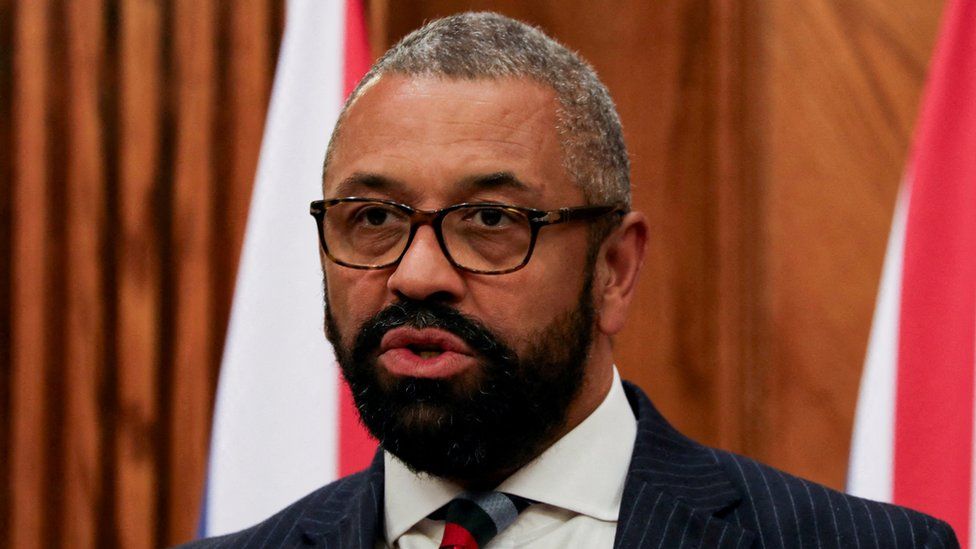
By Becky Morton
Political reporter
Foreign Secretary James Cleverly is visiting Beijing amid criticism from some MPs over the government’s approach to China.
Mr Cleverly, the first senior UK minister to travel to China since 2018, said the country’s global significance meant it could not be ignored.
But MPs on the Foreign Affairs Committee said the government’s strategy on China was incoherent.
And senior Conservative Sir Iain Duncan Smith compared it to “appeasement”.
During his visit Mr Cleverly will hold talks with China’s foreign affairs minister Wang Yi and vice-president Han Zheng.
He has promised to raise concerns over human rights issues, including in Xinjiang and Tibet, as well as the treatment of Hong Kong and sanctions placed on UK MPs.
The war in Ukraine and cyber security are also on the agenda.
Ahead of the visit, Mr Cleverly said: “No significant global problem – from climate change to pandemic prevention, from economic instability to nuclear proliferation – can be solved without China.
“China’s size, history and global significance means they cannot be ignored, but that comes with a responsibility on the global stage.
“That responsibility means China fulfilling its international commitments and obligations.”
Chinese Foreign Ministry spokesman Wang Wenbin said “international and regional issues of common concern” would be discussed.
He added: “We hope the British side will work with us to uphold the spirit of mutual respect, deepen exchanges, enhance mutual understanding and promote the stable development of Sino-British relations.”
The visit comes as the Commons Foreign Affairs Committee criticises the government’s approach to China in a new report on UK policy in the Indo-Pacific.
The report describes the activities of the Chinese Communist Party as “a threat to the UK and its interests”.
It raises concerns about a lack of coherence in the government’s approach and calls for an unclassified version of its China strategy to be published to provide guidance to the public and private sectors.
The committee also argues that all relevant ministers should be briefed on the higher classification version of the strategy.
The cross-party group of MPs also condemn attacks on Hong Kong dissidents in the UK as “a sustained attempt” by China to intimidate its critics and calls on the UK to tell the Chinese government that such a policy is unacceptable.
The committee’s Conservative chairwoman, Alicia Kearns, said it had argued for “the need to balance economic cooperation with caution in the UK’s dealings with China”.
“The confidential, elusive China strategy is buried deep in Whitehall, kept hidden even from senior ministers across government,” she said.
“How can those implementing policy – and making laws – do so without an understanding of the overall strategy?”
Asked on Tuesday if Mr Cleverly should be visiting Beijing, she told the BBC: “It is more important that we are in the room with them in stark disagreement, rather than cutting off relations.”
Image source, Getty Images
The last time a senior UK minister visited China was when then-PM Theresa May travelled to Beijing in 2018
However, former Conservative party leader and minister Sir Iain Duncan Smith, who is one of five MPs sanctioned by China, said the visit was the latest stage of “Project Kowtow”.
He told the PA news agency the UK position “smells terribly of appeasement”.
“It’s like we want more business, therefore we don’t want to upset the Chinese too much,” he said.
“What we end up with is that they think we are just too weak.”
Labour’s shadow foreign secretary David Lammy accused the Conservative government of more than a decade of “division, inconsistency and complacency towards China”.
He said the government needed to secure “tangible diplomatic wins” including an end to Chinese sanctions on British Parliamentarians.
Relations between the UK and China have been strained in recent years over issues including a crackdown on human rights in Hong Kong.
Last year Prime Minister Rishi Sunak said the so-called “golden era” of closer ties with China was over but he also stressed the UK could not simply ignore the country’s significance.
Mr Sunak’s predecessor Liz Truss was reportedly planning to re-categorise China as a “threat” to the UK as part of a foreign policy review.
However, the prime minister has resisted calls from some Tories to go that far.








